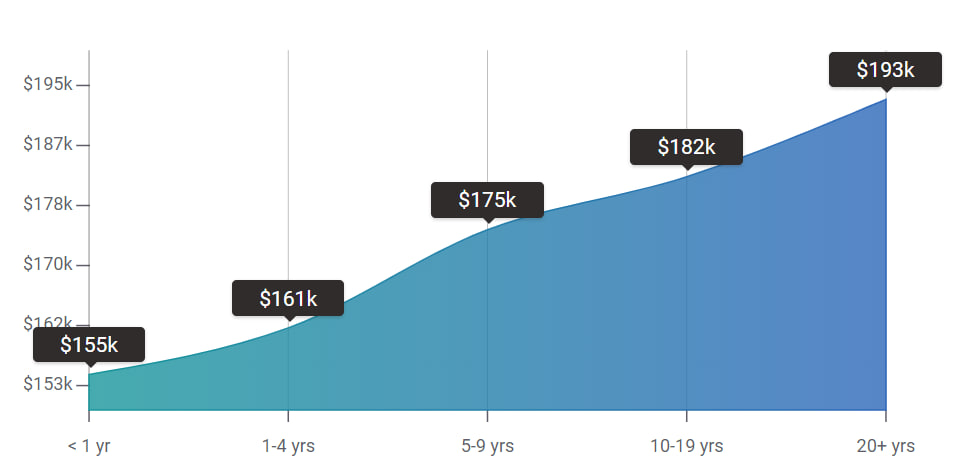From Entry-Level to Experienced: How Nurse Anesthetist Salaries Change with Time

Nurse anesthetists play a critical role in the healthcare industry, administering anesthesia and managing patients' pain during medical procedures. As with any profession, nurse anesthetists' salaries can vary greatly depending on a variety of factors. It's important for those considering a career as a nurse anesthetist, as well as those currently working in the field, to understand how salaries change over time.
In this article, we'll explore how nurse anesthetist salaries change from entry-level to experienced positions. We'll also examine the factors that can affect nurse anesthetist salaries over time, and provide tips for maximizing earnings throughout a career.
Entry-Level Nurse Anesthetist Salaries
Entry-level nurse anesthetists are those who are just starting out in the profession. Typically, they have completed their education and training and are working their first job as a nurse anesthetist. According to PayScale, the median annual salary for nurse anesthetists is $155,000.
Mid-Career Nurse Anesthetist Salaries
Mid-career nurse anesthetists are those who have been working in the field for several years and have gained experience and expertise. They may have taken on additional responsibilities or leadership roles within their workplace. The median annual salary for nurse anesthetists with 5-10 years of experience is $175,000.
Experienced Nurse Anesthetist Salaries
Experienced nurse anesthetists are those who have been working in the field for many years, often more than a decade. They have gained extensive experience and knowledge in administering anesthesia and pain management. The median annual salary for nurse anesthetists with over 10 years of experience is $182,000 and more.

Source: What is the Pay by Experience Level for Nurse Anesthetists (CRNA)s?, PayScale
Factors that Affect Nurse Anesthetist Salaries Over Time
Nurse anesthetist salaries can change over time due to a variety of factors. Some of the most significant factors include:
- Industry demand and job availability: The demand for nurse anesthetists can vary depending on factors such as changes in healthcare policies and population growth. Areas with high demand for healthcare services may offer higher salaries to attract skilled professionals.
- Geographic location: Nurse anesthetist salaries can vary widely depending on the location of the job. For example, nurse anesthetists working in urban areas may earn more than those working in rural areas due to differences in demand and cost of living.
- Additional certifications and education: Pursuing additional certifications or education can help nurse anesthetists specialize in a particular area of anesthesia and increase their earning potential.
- Years of experience: As nurse anesthetists gain experience and expertise, they may be able to take on more responsibilities and command higher salaries.
- Job performance: Nurse anesthetists who consistently perform well and demonstrate a high level of skill and expertise may be rewarded with higher salaries or bonuses.
By understanding these factors and taking steps to maximize earning potential, nurse anesthetists can increase their salaries over time and build a successful career in the field.
Tips for Maximizing Nurse Anesthetist Salaries Over Time
For entry-level nurse anesthetists, there are several tips for increasing their salaries over time. These include:
- Continuing education and certifications: Pursuing additional education and certifications can help nurse anesthetists stay up-to-date on the latest techniques and technologies in the field and demonstrate their expertise to employers.
- Networking and building professional relationships: Networking with other professionals in the field and building relationships with potential employers can help nurse anesthetists learn about job opportunities and advance their careers.
- Job performance and seeking additional responsibilities: Consistently performing well and seeking additional responsibilities can demonstrate to employers that a nurse anesthetist is a valuable asset to their organization and can lead to salary increases or promotions.
For mid-career and experienced nurse anesthetists, there are additional tips for increasing their salaries over time. These include:
- Specializing in a particular area of anesthesia: By specializing in a particular area of anesthesia, such as obstetrics or pediatrics, nurse anesthetists can increase their earning potential and become sought-after experts in their field.
- Pursuing management or leadership positions: Moving into management or leadership positions, such as a chief nurse anesthetist or director of anesthesia services, can lead to higher salaries and greater job satisfaction.
- Moving to a higher-demand geographic location: Moving to a geographic location with a high demand for healthcare services and a shortage of nurse anesthetists can lead to higher salaries and greater job opportunities.

Photo: stefamerpik/Freepik
In conclusion, nurse anesthetist salaries can change over time depending on a variety of factors, including experience, education, and geographic location. By understanding these factors and taking steps to maximize their earning potential, nurse anesthetists can build a successful and lucrative career in the field of anesthesia. By continuing their education, building professional relationships, and seeking additional responsibilities, nurse anesthetists can increase their salaries over time and achieve their professional goals.
- Nurse anesthetist salaries can vary depending on a variety of factors, including experience, education, and geographic location.
- Entry-level nurse anesthetists can expect to earn an average salary range, while mid-career and experienced nurse anesthetists can earn higher salaries.
- Factors that can affect nurse anesthetist salaries over time include industry demand, geographic location, additional certifications and education, years of experience, and job performance.
- Tips for maximizing nurse anesthetist salaries over time include continuing education and certifications, networking and building professional relationships, pursuing additional responsibilities, specializing in a particular area of anesthesia, pursuing management or leadership positions, and moving to a higher-demand geographic location.
FAQ
What are the main challenges of working as a Nurse Anesthetist?
Some of the main challenges of working as a Nurse Anesthetist include dealing with the stress and pressure of administering anesthesia during high-risk procedures, staying up-to-date with advances in anesthesia technology and techniques, and managing patient pain and anxiety during and after procedures. Additionally, working as a Nurse Anesthetist requires strong communication and collaboration skills, as well as the ability to work effectively in a fast-paced and constantly evolving healthcare environment.
What is the certification process for Nurse Anesthetists?
To become a Certified Registered Nurse Anesthetist (CRNA), you must first earn a nursing degree and become a registered nurse. You will then need to complete a master's degree in nurse anesthesia and pass the National Certification Examination (NCE) administered by the National Board of Certification and Recertification for Nurse Anesthetists (NBCRNA).
What are the skills required to be a successful Nurse Anesthetist?
Successful Nurse Anesthetists need to possess strong clinical skills, critical thinking skills, attention to detail, communication skills, and the ability to work well under pressure. They must also have a deep understanding of anesthesia techniques and pharmacology, as well as knowledge of various medical procedures.
What is a typical day like for a Nurse Anesthetist?
A typical day for a Nurse Anesthetist involves preparing patients for anesthesia, administering anesthesia during medical procedures, monitoring patients' vital signs and responses to anesthesia, and managing patients' pain and anxiety before and after procedures. They may also consult with other healthcare professionals, review patients' medical histories, and develop anesthesia plans tailored to each patient's specific needs.